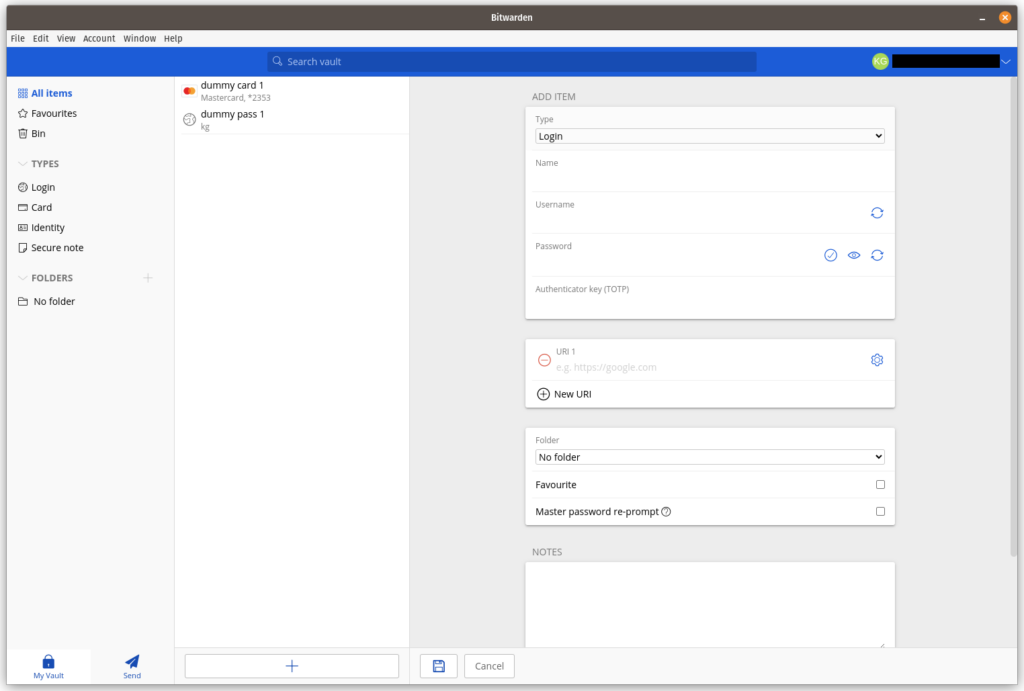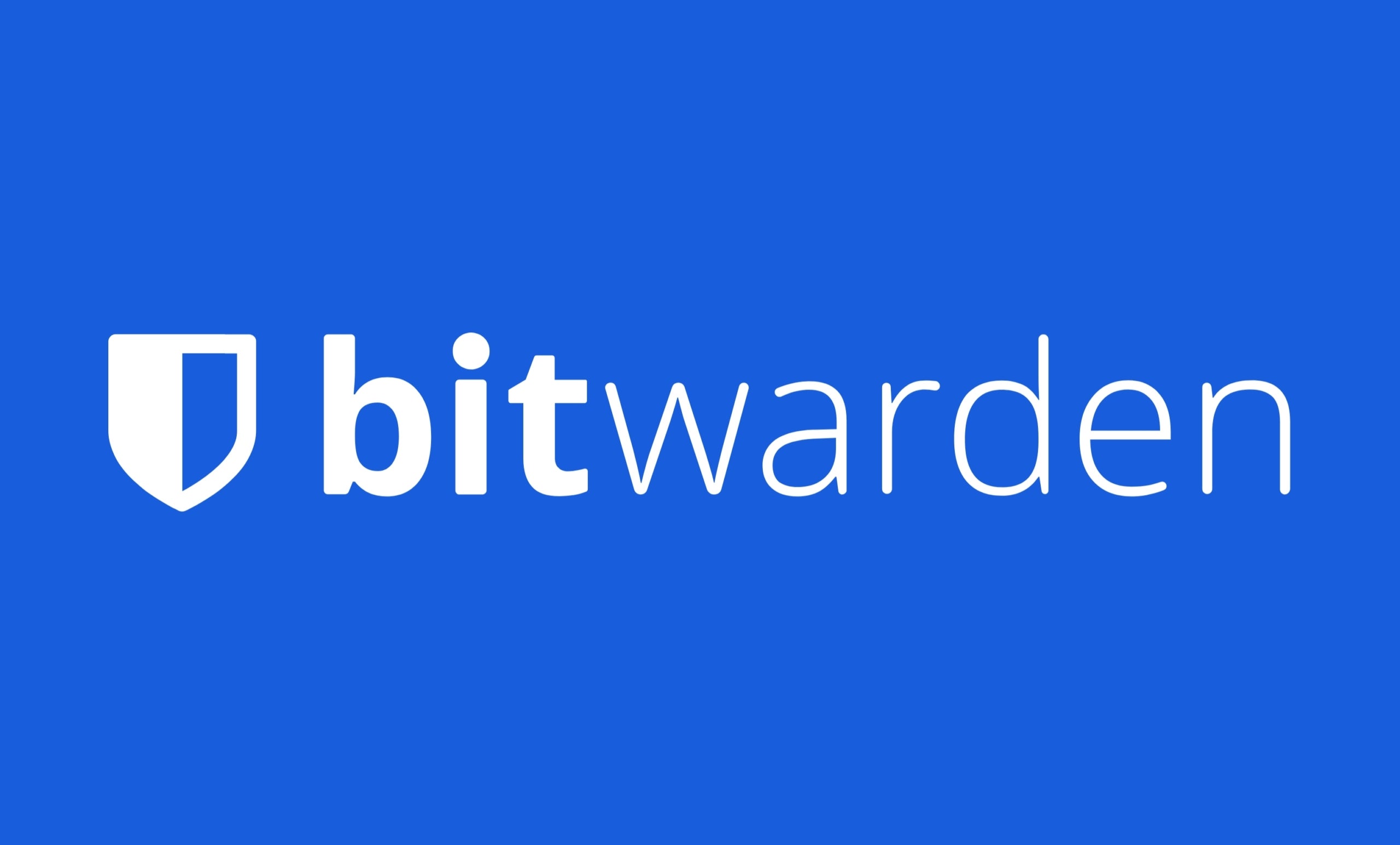Bitwarden provides both the best free and best paid-for online password management service. There are a few specific niches where users might need something else, but this is the ideal password manager for almost everyone.
Pros
- Unlimited free tier
- Inexpensive paid tiers
- Easy to use
- TOTP password generation
Availability
- UKRRP: £8.50
- USARRP: $10
-
SecurityBitwarden uses AES-CBC 256-bit encryption for your Vault data and PBKDF2 SHA-256 to derive your encryption key -
Sharing:Ephemeral sharing (up to 31 days) with any Bitwarden user via Bitwarden Send; share collections with up to one other user via a free organisation or with anyone in your your Bitwarden Families organisation -
Storage: 1GB encrypted attachment or secure file storage for paid subscribers
Introduction
If someone asks me to recommend a password manager, Bitwarden is my first suggestion.
It has one of the best free tiers around and a paid account works out at less than a pound a month, with advanced features that more than justify the cost of subscription.
It’s powerful, customisable but, most importantly, remains easy to use. But is it one of the very best password manager options?
Pricing
A Bitwarden Premium account costs $10 (£8.50) per year, while a Bitwarden Families subscription gets you six accounts for $40 (£34.00) per year, as well as a share group account (an Organisation) to go with your family account.
A free Bitwarden account is fully functional. Unlike LastPass, you can access your passwords on all kinds of devices, and unlike Dashlane’s free tier, there’s no limit on the number of passwords you can save.
Bitwarden does reserve more advanced features for paying users. Free accounts don’t get an emergency access contact, secure file storage, in-client TOTP (Time-based One Time Password) two-factor authentication code generation for stored services, and have fewer 2FA options. You need a paid account if you want to use Duo for multifactor authentication, and only paid organisations (including families) can use FIDO security keys such as YubiKey devices for 2FA.
User experience
- Easy to use, and clearly designed
- Biometric unloicking is avaiable on all platforms
- Advanced features avaiable with paid-for subscription
At its simplest, Bitwarden provides a web vault, browser extensions, autofill and autosave functionality. Just set up an account, plug it into your browser and go. By default, you’ll have to enter your master password every time you restart your browser, while the desktop apps and web vault re-lock themselves on restart or after 15 minutes.
Its browser plugins are cleanly designed and very easy to use, and although the standalone apps and web vault can feel a little busy when you’re editing and saving entries, everything is clearly labelled and well documented.
Logout and lock settings are highly configurable, and biometric unlocking is available for all platforms. If you can’t connect to the internet, an offline cache of your password database is available for read-only access. There’s even a fully offline Bitwarden Portable version for static password collections.
Bitwarden allows you to store logins, payment cards, identity data including your address, national insurance and passport number, and secure notes. Paying users can attach files to entries, allowing you to store passport scans or PGP keys.

The Organisations model is worth paying attention to, because Bitwarden does things a little differently to some of its rivals. If you want to share large numbers of passwords with someone, you’ll need an Organisation, an extra shared password library in addition to your own private one.
Free Organisations can be shared between up to two people, Family organisations by up to six, and there are larger options if you need them, primarily aimed at businesses. You can also share specific passwords (or other secret information) with any other Bitwarden user for a maximum of 31 days via the ephemeral Bitwarden Send tool.
Like most password managers, Bitwarden is a zero-knowledge service, which means that it does not know and cannot discover your master password. If you lose it, you’ll have to reset your account, deleting all stored passwords. However, Organisation administrators can reset the passwords of members of their organisation, and that includes family subscriptions.
Paying users can also designate an emergency contact, who, once set up, can request and be manually or automatically granted access to your account. If you’ve granted them account Takeover access, this emergency contact can also create a new master password for your account if you’ve forgotten it.
You can even host your own Bitwarden server and, although it requires licenses to unlock paid features, Bitwarden is open source and highly transparent in its development and issue reporting process.
Latest deals
Should you buy it?
If you’re looking for convenience:
Bitwarden can be as simple as you want it to be, serving as a simple extension to autofill what’s needed in your browser.
If you require sophisticated and customisable security
Bitwarden offers a high level of user configurability and control, but can’t quite match that of the KeePass family of applications.
Final Thoughts
Bitwarden is the ideal password manager for most people. It’s secure, transparent and has more features than any other paid-for password manager we’ve reviewed, while still being very easy to use.
How we test
We test each password manager ourselves on a variety of computer and mobile operating systems.
We carry out comparative feature analysis against industry standards and rival products, and test security and convenience settings such as default logout behaviour and offline access.
We used for at least a week.
Tested all of the available features.
FAQs
Bitwarden is perfectly safe to use, with AES-CBC 256-bit encryption preventing hackers from stealing your data.
Yes, a free password manager typically has the same level of security as the paid-for versions. By subscring, you just get access to a greater number of advanced features.
Bitwarden provides both the best free and best paid-for online password management service. There are a few specific niches where users might need something else, but this is the ideal password manager for almost everyone.
Pros
- Unlimited free tier
- Inexpensive paid tiers
- Easy to use
- TOTP password generation
Availability
- UKRRP: £8.50
- USARRP: $10
-
SecurityBitwarden uses AES-CBC 256-bit encryption for your Vault data and PBKDF2 SHA-256 to derive your encryption key -
Sharing:Ephemeral sharing (up to 31 days) with any Bitwarden user via Bitwarden Send; share collections with up to one other user via a free organisation or with anyone in your your Bitwarden Families organisation -
Storage: 1GB encrypted attachment or secure file storage for paid subscribers
Introduction
If someone asks me to recommend a password manager, Bitwarden is my first suggestion.
It has one of the best free tiers around and a paid account works out at less than a pound a month, with advanced features that more than justify the cost of subscription.
It’s powerful, customisable but, most importantly, remains easy to use. But is it one of the very best password manager options?
Pricing
A Bitwarden Premium account costs $10 (£8.50) per year, while a Bitwarden Families subscription gets you six accounts for $40 (£34.00) per year, as well as a share group account (an Organisation) to go with your family account.
A free Bitwarden account is fully functional. Unlike LastPass, you can access your passwords on all kinds of devices, and unlike Dashlane’s free tier, there’s no limit on the number of passwords you can save.
Bitwarden does reserve more advanced features for paying users. Free accounts don’t get an emergency access contact, secure file storage, in-client TOTP (Time-based One Time Password) two-factor authentication code generation for stored services, and have fewer 2FA options. You need a paid account if you want to use Duo for multifactor authentication, and only paid organisations (including families) can use FIDO security keys such as YubiKey devices for 2FA.
User experience
- Easy to use, and clearly designed
- Biometric unloicking is avaiable on all platforms
- Advanced features avaiable with paid-for subscription
At its simplest, Bitwarden provides a web vault, browser extensions, autofill and autosave functionality. Just set up an account, plug it into your browser and go. By default, you’ll have to enter your master password every time you restart your browser, while the desktop apps and web vault re-lock themselves on restart or after 15 minutes.
Its browser plugins are cleanly designed and very easy to use, and although the standalone apps and web vault can feel a little busy when you’re editing and saving entries, everything is clearly labelled and well documented.
Logout and lock settings are highly configurable, and biometric unlocking is available for all platforms. If you can’t connect to the internet, an offline cache of your password database is available for read-only access. There’s even a fully offline Bitwarden Portable version for static password collections.
Bitwarden allows you to store logins, payment cards, identity data including your address, national insurance and passport number, and secure notes. Paying users can attach files to entries, allowing you to store passport scans or PGP keys.

The Organisations model is worth paying attention to, because Bitwarden does things a little differently to some of its rivals. If you want to share large numbers of passwords with someone, you’ll need an Organisation, an extra shared password library in addition to your own private one.
Free Organisations can be shared between up to two people, Family organisations by up to six, and there are larger options if you need them, primarily aimed at businesses. You can also share specific passwords (or other secret information) with any other Bitwarden user for a maximum of 31 days via the ephemeral Bitwarden Send tool.
Like most password managers, Bitwarden is a zero-knowledge service, which means that it does not know and cannot discover your master password. If you lose it, you’ll have to reset your account, deleting all stored passwords. However, Organisation administrators can reset the passwords of members of their organisation, and that includes family subscriptions.
Paying users can also designate an emergency contact, who, once set up, can request and be manually or automatically granted access to your account. If you’ve granted them account Takeover access, this emergency contact can also create a new master password for your account if you’ve forgotten it.
You can even host your own Bitwarden server and, although it requires licenses to unlock paid features, Bitwarden is open source and highly transparent in its development and issue reporting process.
Latest deals
Should you buy it?
If you’re looking for convenience:
Bitwarden can be as simple as you want it to be, serving as a simple extension to autofill what’s needed in your browser.
If you require sophisticated and customisable security
Bitwarden offers a high level of user configurability and control, but can’t quite match that of the KeePass family of applications.
Final Thoughts
Bitwarden is the ideal password manager for most people. It’s secure, transparent and has more features than any other paid-for password manager we’ve reviewed, while still being very easy to use.
How we test
We test each password manager ourselves on a variety of computer and mobile operating systems.
We carry out comparative feature analysis against industry standards and rival products, and test security and convenience settings such as default logout behaviour and offline access.
We used for at least a week.
Tested all of the available features.
FAQs
Bitwarden is perfectly safe to use, with AES-CBC 256-bit encryption preventing hackers from stealing your data.
Yes, a free password manager typically has the same level of security as the paid-for versions. By subscring, you just get access to a greater number of advanced features.

























